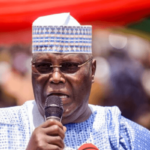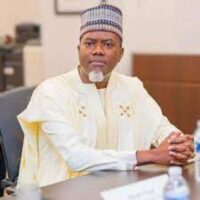Nume Ekeghe
In an era defined by innovation, where ideas have become the new currency of leadership, few names in Africa’s corporate and technological landscape evoke as much admiration as Mitchell Elegbe, the Group Managing Director and Founder of Interswitch Group. To those who know the story of Africa’s fintech awakening, Elegbe is not merely a pioneer; he is the architect of a movement that redefined how a continent connects, transacts, and thrives in the digital economy.
Today marks another milestone in the life of a man who has more than two decades building bridges between technology and trust, between finance and freedom, between vision and value. Yet, beyond the high-tech corridors of his company and the dazzling success metrics that have followed, lies the story of a man driven not by ambition alone, but by purpose, a quiet revolutionary whose life mirrors the transformation he has championed.
Born in Benin City in the old Mid-Western Region of Nigeria, now Edo State, Mitchell’s beginnings were as humble as they come. He never met his father, who passed away before he was born. Raised by his mother and later by an uncle who became a father figure, Mitchell’s childhood was steeped in values of resilience, integrity, and hard work. It was an upbringing that nurtured self-reliance and a deep sense of responsibility, virtues that would later define his leadership philosophy.
He attended secondary school in Aladja, Delta State, and later proceeded to the University of Benin to study Electrical/Electronic Engineering. Even as an undergraduate, the entrepreneurial spark that would shape his destiny was already alive. While other students were content navigating campus life, Mitchell was busy recording songs on audiotapes for sale and trading shirts to make ends meet. Those small ventures, modest as they seemed, instilled in him the early discipline of enterprise, the conviction that value creation begins with the courage to start something, no matter how small.
After university, he served in the National Youth Service Corps (NYSC) and was posted to Computer Systems Associates (CSA), a company that introduced him to the complex world of financial networks and SWIFT connectivity for banks. That exposure to digital infrastructure and systems integration marked the beginning of his fascination with how technology could solve real human problems.
Mitchell’s first professional stint came with Schlumberger Wireline and Testing in Scotland; a global oilfield services company where he worked as a field engineer. Yet, even amid the structured sophistication of the global corporate world, he felt a pull toward home, a desire to make an impact where it mattered most. On returning to Nigeria, he joined Telnet, a budding telecommunications firm that was pushing the boundaries of technology integration in Nigeria. His intellect, curiosity, and drive quickly set him apart, and within a short time, he rose to become Group Head, Business Development.
It was at Telnet that the idea that would later redefine Nigeria’s financial landscape began to form. At the time, financial transactions in the country were largely manual. Long queues in banking halls, endless paperwork, and the inconvenience of carrying cash were all too common. Weekends often began with Friday withdrawals, as Nigerians stocked up on cash to survive two days of closed banking operations: a practice that, in turn, fueled crime and inefficiency. Mitchell saw not just the inconvenience but the deeper inefficiency holding back a nation’s productivity.
While others complained, he began to think. What if technology could switch transactions seamlessly between banks? What if payments could be made electronically, in real-time, without the barriers of distance or time? It was these questions and his refusal to accept that Nigeria could not build a solution for itself that gave birth to an idea that would transform a continent.
He shared his vision of a transaction switch with some of his friends and colleagues at Telnet, who encouraged him to pursue it. The journey was anything but easy. Many institutions were skeptical. Banks and regulators were slow to adopt the idea of electronic payment at a time when “digital” was a foreign word in Nigerian finance. But Mitchell was undeterred. With the support of Accenture and a group of forward-thinking Nigerian banks, he went on to establish Interswitch in 2002, an indigenous technology company built to connect the entire financial ecosystem.
Interswitch began as a simple idea: to create a platform that would enable the seamless electronic circulation of money. But its implications were revolutionary. In a country struggling with infrastructure, unreliable power supply, and a deep-seated cash culture, building a 24/7 digital payment network required courage, technical excellence, and faith. Mitchell had all three.
As the founding CEO, a role he reluctantly accepted when the company could not afford an expatriate to lead it, Elegbe brought a rare combination of visionary zeal and pragmatic execution. He was not just building a company; he was building trust in a system that had never existed before, and trust in a future that seemed uncertain. Under his leadership, Interswitch became the backbone of Nigeria’s electronic payment infrastructure. Almost every bank in Nigeria now relies on its platform. Over 11,000 ATMs and millions of digital transactions run on systems that trace their lineage back to the solution Mitchell envisioned two decades ago.
Yet, even as Interswitch expanded beyond Nigeria into other African markets, Mitchell remained grounded. He often said, “Being trustworthy is the most important attribute anyone can have.” For him, success has never been about the accolades, but about the lives touched, the young engineers empowered, the customers served, and the industries transformed.
Interswitch’s growth has mirrored the evolution of Africa’s fintech landscape. The company has birthed some of the continent’s most iconic payment products, including Quickteller, Verve, and Paydirect. These are not just tools of convenience, they are gateways to inclusion, empowerment, and connectivity for millions who were once excluded from formal finance.
Through his leadership, Interswitch became one of Africa’s first unicorns, a homegrown billion-dollar enterprise built on African soil, with African talent, solving African problems. Mitchell’s philosophy of long-term value creation has ensured that Interswitch remains not just a company, but an institution. Its impact extends into sectors like healthcare, government services, transportation, entertainment and utilities showing that technology, when guided by purpose, can be a powerful enabler of progress.
But beyond the corporate boardrooms and the headlines, there is another side to Mitchell Elegbe: the mentor, the family man, the philosopher of everyday life. His interest in people development is deeply personal. Having risen through the crucible of hardship and self-belief, he is passionate about guiding the next generation. Through various channels, he supports high-impact entrepreneurs, he actively mentors young founders, offering them not just business advice, but perspective: that success is not only measured by profit, but by purpose.
Those close to him describe a man who leads with calm conviction, preferring to inspire rather than instruct. His leadership style is inclusive and collaborative, rooted in empathy. He believes that great organizations are built not by the brilliance of one, but by the collective energy of many. This belief has shaped Interswitch’s culture: a blend of discipline, innovation, and shared ownership that continues to power its relevance in an increasingly competitive landscape.
At home, Mitchell is no less inspiring. He is devoted to his wife, Mercy, who he met at the University of Benin. She studied Chemical Engineering, and together they have built a home anchored in love, faith, and mutual respect. They are blessed with four children, a set of twin boys, a daughter, and a younger son. Family, for Mitchell, is sacred. It is where he finds balance, perspective, and renewal.
He speaks often about how the pandemic, though disruptive, gifted him something rare: time. “It allowed me to spend the most extensive unbroken stretch with my family in many years,” he once shared. Outside work, he finds joy in the gym, in martial arts, and in music. His taste in music is eclectic as he believes that melodies have a way of grounding the mind and healing the soul. Those who know him well often speak of his sense of style, refined yet understated. For him, aesthetics and discipline go hand in hand; creativity, whether in fashion or problem-solving, reflects inner order.
Mitchell’s reflections on Nigeria and Africa reveal a mind deeply invested in the continent’s future. Over the years, he has grown increasingly vocal about the role of policy and governance in driving sustainable development. He believes Africa’s greatest challenge is not talent or resources, but the failure to align good intentions with effective execution. From his vantage point in the private sector, he envisions a new model of partnership, one where public and private interests converge to build systems that work.
He does not rule out a more direct role in public policy someday. For now, his focus remains on deepening Interswitch’s impact, expanding digital inclusion, and building ecosystems that outlive personalities. Yet, there is an unmistakable sense that his story is still unfolding, that the same restlessness that once pushed him to reimagine banking in Nigeria may one day inspire him to reimagine governance.
For all his achievements, Mitchell remains humble. Those who work with him often describe his quiet sense of humor, his patience in the face of pressure, and his ability to see opportunity in crisis. He does not posture or preach; instead, he listens, thinks, and acts. This authenticity, rare in corporate leadership, has made him not just a boss, but a mentor to many, a friend to peers, and a role model to countless young Africans who see in him the proof that greatness can emerge from the most ordinary beginnings.
As he marks another year, it is fitting to reflect on how one man’s idea could transform an entire continent’s financial DNA. From the days of long queues with tally numbers and bulky wallets to today’s tap-and-go convenience, Africa’s digital payment story cannot be told without mentioning Mitchell Elegbe. His legacy is not only in the systems built, but in the unlocked possibilities. He reminds us that technology is not about machines; it is about people, about giving them the tools to live, trade, and dream differently.
Elegbe’s life exemplifies the power of vision anchored in integrity. It teaches that leadership is not about titles or wealth, but about service. It shows that innovation, when inspired by empathy, can become a force for societal transformation. And perhaps most importantly, it affirms that no dream is too ambitious for those who choose to believe, build, and persevere.
Elegbe stands as proof that African solutions can emerge from African minds, that world-class innovation need not be imported, but can be built, refined, and scaled from home soil. His journey, from the young engineer in Benin City to the helm of one of Africa’s most transformative enterprises, is not just inspiring; it is instructive. It teaches that success is not about speed but about steadfastness, not about visibility but about vision. It shows that character, not circumstance, defines destiny.
There are many ways to measure a man’s life: by wealth, by titles, by applause. But perhaps the truest measure is impact: how many lives are better because you existed. By that standard, Mitchell Elegbe’s impact is undeniable. Through Interswitch, he has not only built a company but ignited a movement, one that continues to power Africa’s digital evolution. And as he continues to look ahead with the same quiet resolve that has defined his journey, one truth remains constant: Mitchell Elegbe is not just the man behind the switch. He is, in every sense, the man who helped Africa turn it on.
As he adds another year to a remarkable life, one can only imagine that his best chapters, that will continue to shape the future of Africa’s digital economy and inspire generations to come, are yet to be written!

















Leave a comment